Key takeaways:
- Understanding custody types (physical and legal) is essential for creating arrangements prioritizing the child’s well-being and stability.
- Effective communication and establishing clear boundaries with your ex can significantly improve co-parenting dynamics and support the child’s needs.
- Seeking professional support and resources, such as therapy and co-parenting workshops, can provide valuable strategies for managing conflict and enhancing cooperation.
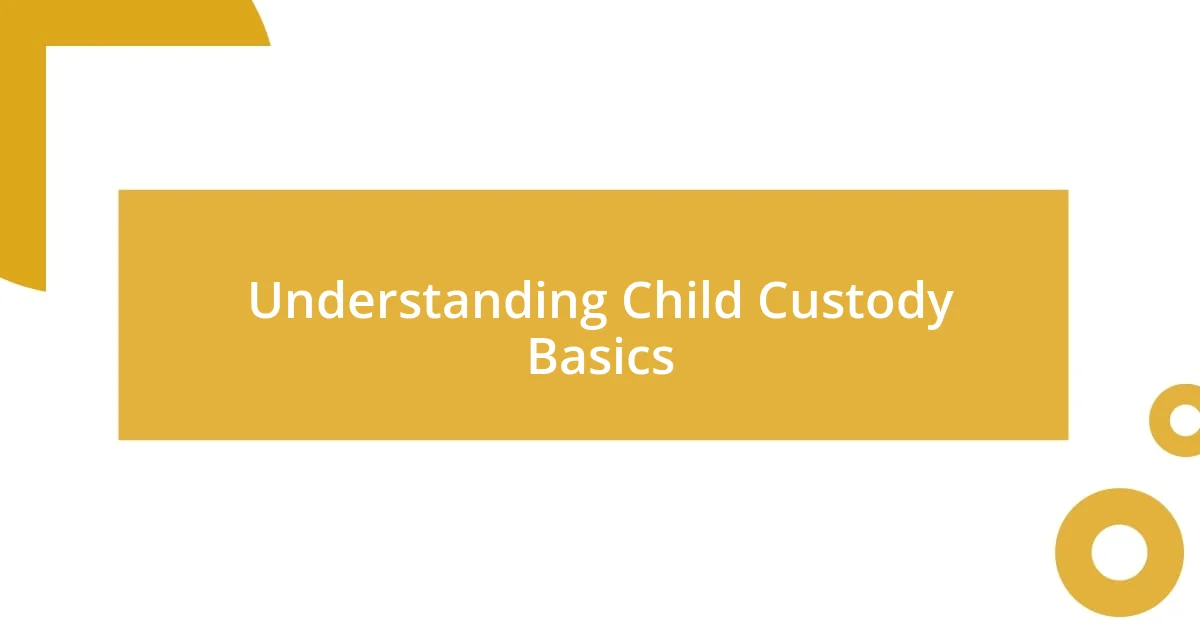
Understanding Child Custody Basics
When diving into child custody, understanding the types of custody is crucial. There’s physical custody, which determines where the child lives, and legal custody, which grants parents the right to make important decisions about the child’s upbringing. When I first faced this situation, I remember feeling overwhelmed by these distinctions—how could I navigate something so important without the right knowledge?
I often reflect on the emotional weight that custody arrangements carry. It’s not just about legal terms; it’s about nurturing a child’s well-being and stability. Have you ever thought about how a child might feel switching between homes? That was a major concern for me—I wanted to ensure that my child felt a sense of belonging and security, regardless of the custody agreement.
Navigating custody agreements can be a delicate dance of cooperation between parents. It’s easy to let emotions run high, but I learned that approaching discussions with a mindset focused on the child’s best interests can create a more collaborative atmosphere. Have you had moments where setting aside your feelings for the sake of your child’s happiness made a difference? I certainly have, and those instances taught me invaluable lessons about prioritizing my child’s needs over my own.

Evaluating Your Custody Options
When evaluating your custody options, it’s essential to consider what arrangement promotes your child’s emotional and psychological health. For me, this journey meant reflecting on the impact of different living situations and the roles both parents would play in their life. One option I found particularly effective was creating a balanced schedule that allowed my child to spend quality time with both parents, mitigating feelings of loss or anxiety.
Here are a few key factors to assess in your decision-making process:
- Child’s Age: Younger children might need more stability, while teens may benefit from having a say in their living situation.
- Parental Availability: Assess your work schedules and how they affect your ability to be present for your child.
- Child’s Preferences: If appropriate, involve your child in conversations about their preferences; it can provide valuable insights into their feelings.
- Location Stability: Consider the distance between both homes—proximity can ease transitions and promote stability.
- Support Systems: Evaluate which parent has a stronger network of family and friends to support the child’s developmental needs.
Reflecting on my own custody evaluation, I realized the importance of flexibility. My initial plan focused rigidly on time-sharing but, as we went along, adapting based on my child’s needs became vital. Sometimes, life throws unexpected challenges, and being willing to adjust can significantly impact your child’s well-being and happiness in the long run.
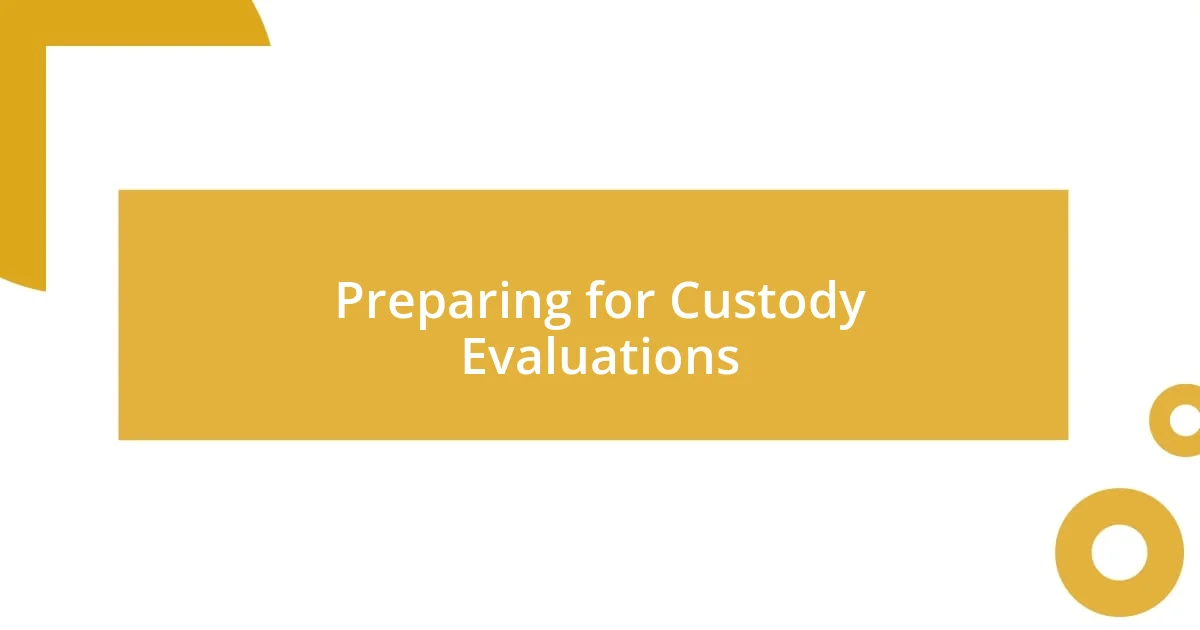
Preparing for Custody Evaluations
Preparing for custody evaluations can feel daunting, but I believe that preparation is key. I found it helpful to gather relevant documents, including parenting plans, schedules, and any communication with the other parent. This not only demonstrates my commitment as a parent but also ensures I can provide concrete examples of how I prioritize my child’s needs. Additionally, acknowledging my emotions early on allowed me to approach the evaluation with a clear mind.
One of my most effective strategies was to practice answering potential questions that might arise during the evaluation. I often role-played scenarios with a trusted friend, which helped build my confidence. Reflecting on my experiences, I remember being asked about times my child faced challenges. I quickly shared a moment when my child excelled in school despite the transition, showing resilience that came from their support system. This reflection reinforced that it’s not just about presenting facts; it’s about communicating my genuine involvement and connection with my child.
During the preparation process, I made a list of my child’s daily routines, interests, and social circles. This helped me understand and articulate the environment I provide for my child. Have you ever thought about how much those little details can make a difference? In my case, I found that the evaluator appreciated hearing about my child’s favorite activities and friends, which showcased my attentive parenting. Engaging in this process can transform it from a daunting experience into an introspective journey that highlights your commitment as a parent.
| Aspect | My Approach |
|---|---|
| Document Preparation | Gather relevant parenting documents |
| Practice Responses | Role-play potential questions |
| Daily Routines | List of activities and interests |

Effective Communication with Your Ex
Effective communication with your ex can be a game changer. I recall a time when a minor scheduling conflict arose, and I chose to reach out directly. Rather than sending a text filled with frustration, I took a moment to breathe and approached the conversation calmly. This simple act led to a more constructive dialogue where we both felt heard and respected, ultimately benefiting our child’s routine.
It’s important to choose the right channel for these conversations. I learned that sometimes face-to-face discussions yield a better understanding than text messages, which can be easily misinterpreted. In one instance, I invited my ex for a coffee to discuss our co-parenting strategy. The warmth of that setting allowed us to openly express our concerns and ideas, making it clear that we both prioritized our child’s best interests. Have you ever tried a face-to-face conversation instead of texts? The difference can be astounding.
Staying focused on common goals can also make a significant impact. I found that creating a shared document outlining our child’s activities, schedules, and preferences fostered a sense of teamwork. It shifted our perspective from “you versus me” to “us working together.” This collaboration transformed our relationship into a more cooperative dynamic, which has paid off in how smoothly we navigate parenting together. Reflecting on these experiences, I understand that effective communication is an evolving skill that can strengthen your co-parenting journey.
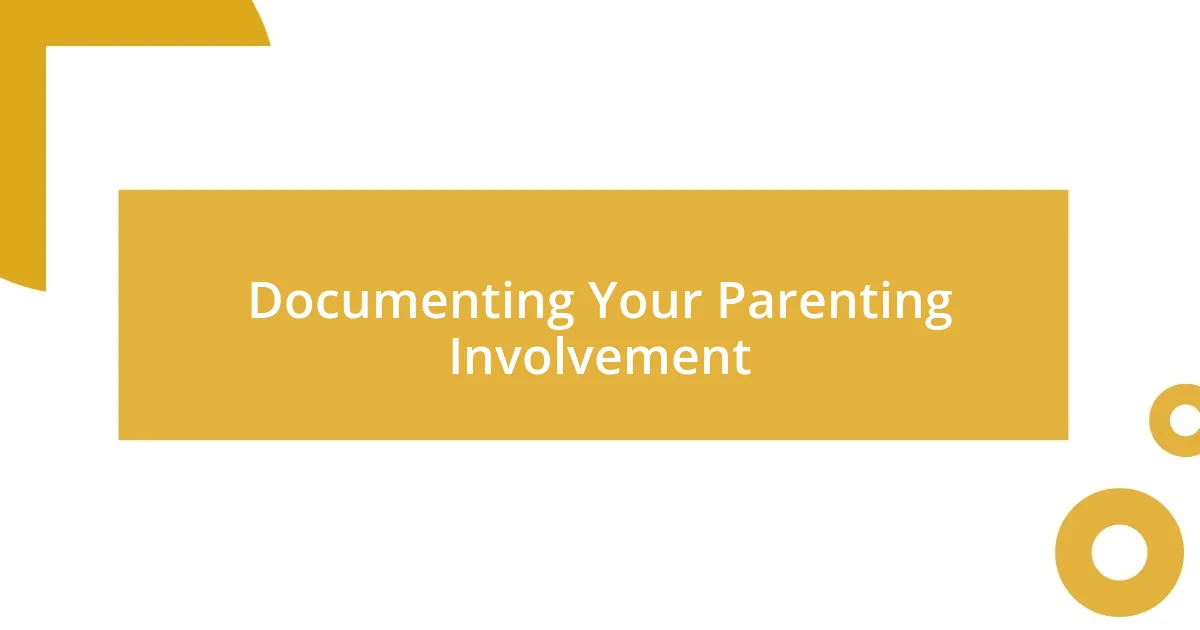
Documenting Your Parenting Involvement
When it comes to documenting my parenting involvement, I quickly learned that keeping a comprehensive record is essential. For instance, I started using a simple journal app on my phone to jot down significant moments and daily activities with my child. Whether it’s noting when we baked cookies together or detailing our weekly game nights, these entries create a vivid picture of my engagement and approach. Have you considered how daily memories can serve as invaluable evidence during custody discussions?
I also found that taking photos can enhance this documentation process. Capturing candid moments—like my child’s excitement at their school play or snapshots from family outings—added a visual element that spoke volumes. These images not only showcase the fun we have but also serve as reminders of the bonds we’re building. I remember sharing a photo album during one evaluation, and the evaluator responded positively to the warmth and joy reflected in those pictures.
Additionally, creating a calendar with marked achievements and milestones helped me stay organized. I included important events like school performances, doctor’s appointments, and playdates in a shared digital calendar with my ex. This not only clarified our co-parenting logistics but also highlighted my proactive approach to involvement. Reflecting on this experience, I realize that being deliberate about documentation transforms it from a chore into a powerful tool that reinforces your active role in your child’s life.
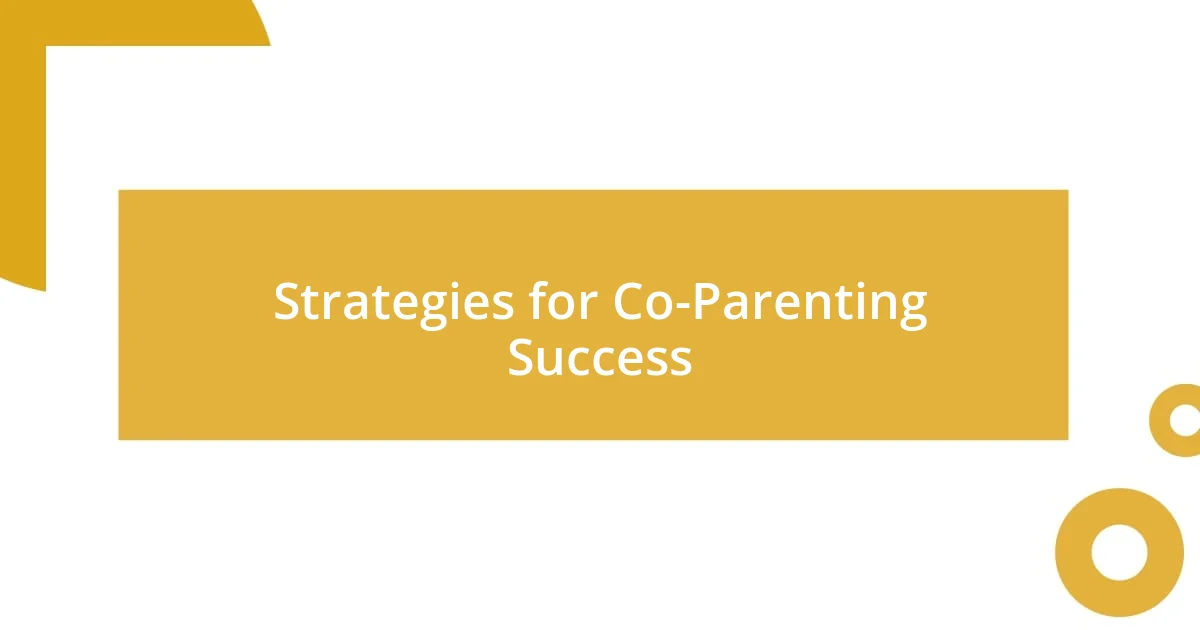
Strategies for Co-Parenting Success

Setting Boundaries and Expectations
Establishing clear boundaries is key to a successful co-parenting relationship. I remember a time when I felt overwhelmed by back-and-forth messages about logistics; it was exhausting. So, I set a specific time each week for co-parenting discussions. This shift not only minimised miscommunication but also gave us both a structured space to address issues. Have you considered carving out dedicated time for these conversations?
Another important strategy is being consistent about expectations. I recall when my child had a soccer game, and my ex and I discussed ahead of time who would be responsible for what. Laying this groundwork ensured that we both showed up without surprises, allowing our child to feel secure and supported. Consistency isn’t just beneficial for us; it creates a stable environment where our child can thrive.
Don’t underestimate the power of being flexible when necessary. There was an occasion when a family emergency came up for my ex, and I quickly stepped in to help out with our child’s needs without hesitation. This little act of goodwill not only strengthened our co-parenting bond but also showed our child that we can support one another for their sake. Flexibility can sometimes be the unexpected key to maintaining harmony in co-parenting; have you ever found yourself stepping in to help your ex? It can really make a difference.
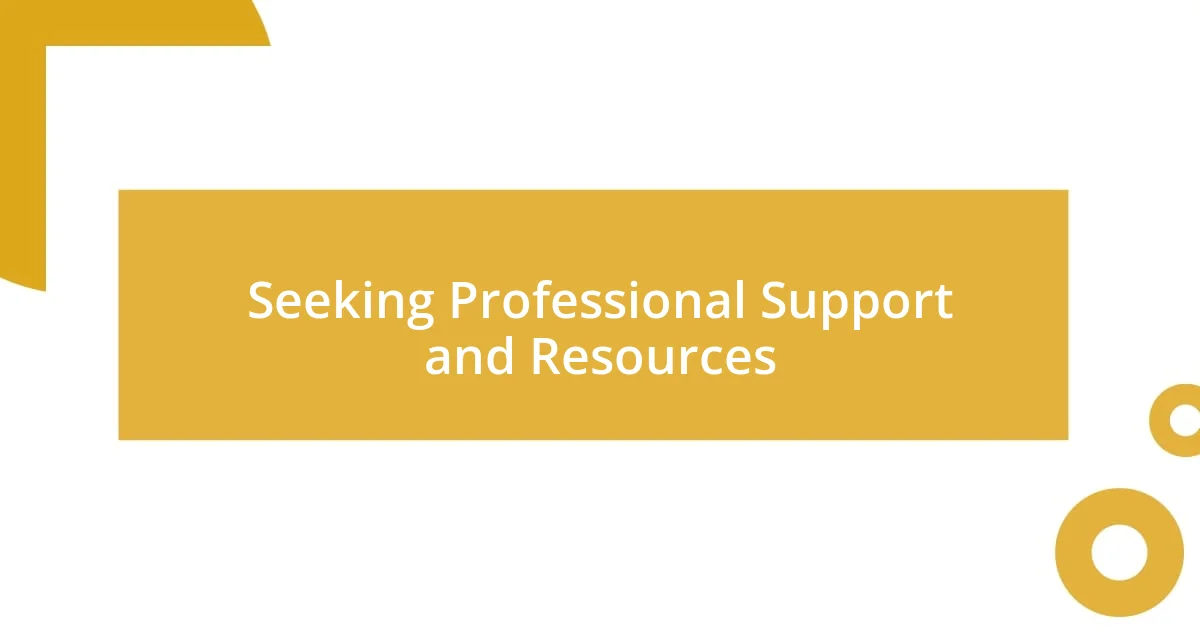
Seeking Professional Support and Resources
When navigating child custody situations, seeking professional support has been invaluable for me. I remember my first consultation with a family therapist; their insights into effective communication really shifted my perspective. It’s amazing how having an objective third party can illuminate ways to manage conflict and create a cooperative co-parenting dynamic. Have you ever considered how a professional could help clarify your own situation?
Moreover, I discovered online resources and workshops that offer strategies specifically tailored for co-parents. One session I attended focused on emotional regulation, which has been a game-changer for me. Learning to manage my emotions not only improves my interactions with my ex but also sets a positive example for my child. It’s like gaining a toolkit full of techniques to handle challenging moments—who wouldn’t want that kind of preparation?
Finally, I can’t emphasize enough the importance of connecting with support groups, either online or in-person. Sharing experiences with others who are in similar situations has been validating and reassuring. In one group I joined, we shared stories that ranged from successful co-parenting triumphs to the challenges that kept us up at night. Knowing I wasn’t alone in facing these hurdles made a significant difference in my outlook. If you’ve ever felt isolated in your struggles, seeking this kind of support might just be the lifeline you need.














